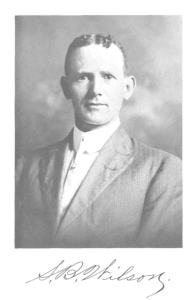 In the financial system which so facilitates the operations even of local trade, Cross Plains included among its capable bank officials, the genial young cashier, Samuel B. WILSON. His is a Tennessee family, identified with the interests of this state for several generations.
In the financial system which so facilitates the operations even of local trade, Cross Plains included among its capable bank officials, the genial young cashier, Samuel B. WILSON. His is a Tennessee family, identified with the interests of this state for several generations.
Through his mother, Mr. Wilson is a descendant of the Bennett line, of early Tennessee settlement, his grandfather, Burrell BENNETT, having been a prosperous farmer and slave-owner. His daughter, Elizabeth (1849-1899), born in Sequatchie, Tennessee, was united in marriage with William H. WILSON (1847-1897) and shared his fortunes during their half-century of life together.
William WILSON was a school teacher and farmer. At one time he was was possessed of abundant property and money, but his was the fate of the too kindly man who signs security papers for the unreliable, for in that way he sacrificed his means, very shortly before his death. He is remembered as a man of particular intelligence and generous character. A Democrat in politics, he took a lively interest in local affairs of a public nature. He was active and honored in the organizations of the Ancient Free and Accepted Masons, and was an esteemed member of the Cumberland Presbyterian church, as his wife was of the Baptist.
William and Elizabeth WILSON were the parents of five children, all of whom are yet living. Of these the youngest was named Samuel B., and he it is whose life forms the special subject of this sketch.
Born in Sequatchie County, Tennessee, on the important date of July 4, in 1880, Samuel B. WILSON followed the usual experiences of a well-to-do farmer’s son in the rural schools, with additional advantages from the school systems of Knoxville and Chattanooga.
His education completed, as a young man Mr. WILSON first occupied himself with farming occupations. Subsequently he accepted employment in a mercantile establishment. From that he passed to a position as assistant cashier in the bank at Whitwell, Tennessee. There he remained for two and one-half years. In 1907 he came to Cross Plains, Tennessee, where he assisted other public-spirited and enterprising citizens in organizing a similar commercial institution. He was made first cashier at his bank at Cross Plains, which has a capital of $20,000, a surplus of $2,000 and an average deposit of $55,000. Mr. Wilson is a director and stockholder of the bank.
Other financial interests of Samuel B. WILSON include his farm of 300 acres, a part of the original homestead of his grandfather, BENNETT, Besides a share with his brother-in-law, in a mercantile business near Chattanooga. Mr. WILSON is a wide-awake man about town and is honored in the fraternal circles of the Free and Accepted Masons, the Independent Order of Odd Fellows and Modern Woodmen of America. He is a member of the Methodist Episcopal church, South.
Source: Hale, Will T, and Dixon L. Merritt. A History of Tennessee and Tennesseans: The Leaders and Representative Men in Commerce, Industry and Modern Activities. Chicago: Lewis Pub. Company, 1913. Volume 5.
